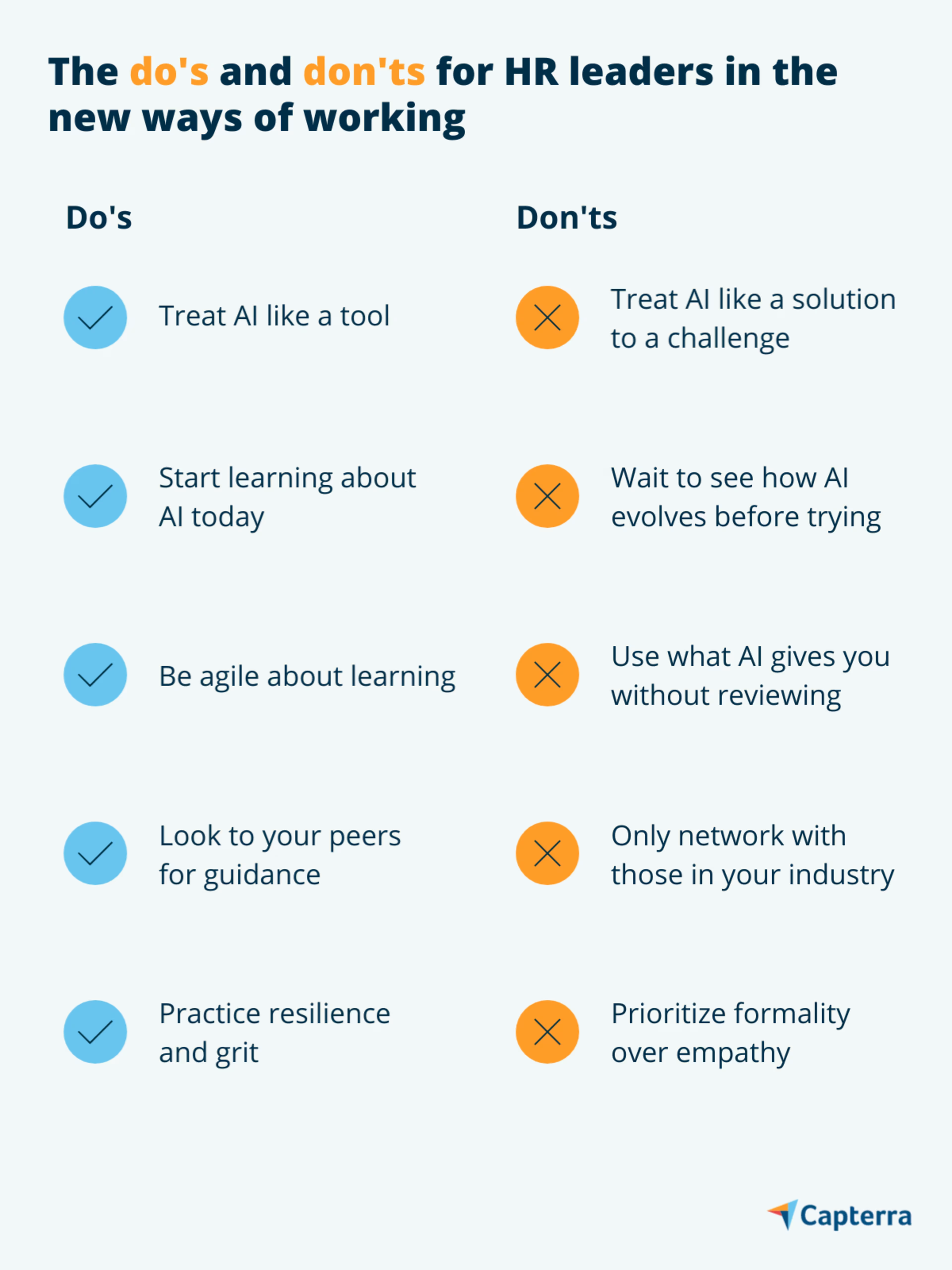With the future of work evolving, HR has the opportunity to shape what it will look like—here's why.
We often talk about the future of work from the employee perspective, but what will be the place of HR leaders in that still-evolving world? Changes in technology, workforce demographics, and business strategy have pushed HR leaders more and more into the spotlight. As executive leadership increasingly recognizes the importance of talent management and employee engagement, HR leaders are playing a more important role in shaping what work will look like in the future.
To delve into this subject, we sat down with Lars Schmidt[1], an HR leader and futurist with a mission to accelerate innovation in HR, to explore how artificial intelligence (AI) and other technologies can be harnessed, what the most important attributes are for HR leaders in these volatile times, and how they can best contribute to business goals.
AI adoption can't (and shouldn't) wait
With all the attention being paid to AI, we first asked Schmidt how AI was impacting HR leaders. He strongly stressed that it was a tool, not a competency and not a capability, but a tool. A potentially extraordinarily useful one.
"Certainly, if you figure out how to leverage it, AI will be an impact magnifier, the likes of which we've never seen in the HR field,"


Lars Schmidt
HR leader and futurist
Talking about generative AI specifically, Schmidt says it gives HR leaders a running start on solving challenges. "Is it going to produce something that you can copy and paste and just use? No. But it's a huge, huge value-add and productivity aid," Schmidt says. "Every HR professional today needs to be learning about AI, and there’s no time to waste because of the speed at which it is developing."
In this case, the traditional attitude of HR thinking that you can sit back and see how nascent technologies evolve in six or 12 months is completely wrong. There isn't time for that.
"You need to be looking at these tools now. You need to be understanding how you can use them now, and the HR leaders that do will have a huge advantage over their peers that don't," Schmidt says.
How HR leaders can be more impactful
Two things are essential for HR leaders who want to succeed in the new ways of working: Learning agility and network equity.
"You need to have both. You have to invest in both," says Schmidt. "And these are not things that you do in addition to your job. These are part of your job."
When asked what the worst mistake HR leaders could make regarding technology, Schmidt is adamant. "It's people thinking that technology is the solution to a challenge—any challenge—they face," he says.
Remember, technology is a tool. Treat it that way.
"Framing it any other way means you're always going to be disappointed," Schmidt says. "That's not how HR works."
Hone learning agility and build network equity
Learning agility is all about staying curious, according to Schmidt. You should apply this to AI and other emerging technologies and to everything else in the world around you.
"For three years, we’ve been in a cycle of incredible change, incredible volatility. Everything is unpredictable. It’s going to continue to be that way."
Lars Schmidt
Because of this, HR leaders must be extraordinarily agile about learning.
"We need depth and clarity to our thinking that is only attainable by being curious about what’s outside our own four walls and even beyond our domain," says Schmidt.
HR leaders can look to each other and the changing industry for guidance.
The idea that networking is valuable is not new. That's something we've been talking about for years. But network equity is a different way of approaching building your network. It's about being much more proactive and intentional around curating and engaging a diverse and robust array of professional colleagues in HR and beyond.
"This isn't about going to a networking event and collecting business cards," says Schmidt. "This is about saying, 'This is my work domain. Here are some other people who are very good at this domain, whom I need to cultivate relationships with.'"
Just as importantly, you need to find people who are doing work completely outside of your own domain.
"When you've been successful at building your network equity and you have a truly diversified network, what you possess is a "collective intellect" that makes you even more valuable," says Schmidt.
"And what I mean by that is that the value that you bring to the table as either an employer or employee is no longer just about the knowledge that you possess in your head or your hands. It's about the knowledge you have access to. It's about that collective intellect."
The need for resilience and grit
In addition to those two attributes of learning agility and network equity—which Schmidt calls the "pillars" of HR leadership—you also need to be strong. You need resilience and grit.
"HR is not easy work, especially for leaders," Schmidt says. "You're on the front lines of a lot of really difficult stuff. The last three years have really reinforced that. There's the pandemic, social justice issues, war, conflict, erasures, reproductive freedoms, political toxicity—and all of these things are entering the workforce."
HR leaders must navigate these issues on multiple levels. As executives, they have to help inform their C-suite peers. As business leaders they must guide the employees under them. As managers, they're helping their teams. And they could be trying to deal with these issues personally.
The new HR catchwords: Empathy, compassion, and vulnerability
Indeed, when we talk about HR leadership today, we talk more about terms like empathy and compassion and vulnerability than we ever did before. It wasn't long ago that the persona of an executive was polished and buttoned up and formal and corporate, but that's not the case anymore.
"We've been through a pandemic together. We've been in each other's homes through Zoom. We've seen each other at high points and at difficult moments. The notion of separation between work and personal life has evaporated, and I think more people are okay with that," says Schmidt.
Does this make the HR function more strategic?
"I don't know if I would use the word strategic," says Schmidt. "Being able to connect with employees more, having more shared experiences that we're comfortable articulating, and having that level of trust through mutual respect and understanding. I think those are the things that make the HR function more valuable to the business because they allow the leaders to balance the needs of both the employees and the business."
An optimist's take on what lies ahead
Many worry today that technology like AI is going to have a tremendously negative impact on the workplace, that many jobs will vanish and humans will be made redundant. We asked Schmidt if he thought that was the case. "There's a pessimistic take on that question and an optimistic take," he says. "I'm an optimist, so I'm going to give you the latter."
Many people go into the HR profession because there's a general interest in humans, but also in being supportive and helping to connect people. Yet many aspects of HR work today are manual data entry, manual follow up, manual research.
"That's not the best use of our time, and, thanks to AI, we're not going to have to do it much longer," Schmidt says. "The robots will actually allow us to focus more on the human side of what we do."
Will some jobs be eliminated? Absolutely. Will some jobs be diminished? Yes, they will.
"But it's important for anybody who might find themselves in that situation to go back to those two pillars continually: learning agility and network equity," Schmidt says. "If you're investing in those things, you're building transferable skills."
In terms of functions that are going to be disrupted by AI, Schmidt thinks HR professionals are going to be in a pretty good position compared to others because they have developed so many transferable skills.
"For those HR leaders who prepare, they can look forward to a bright future where they will become critical partners in driving business success," says Schmidt.

For more of Lars’ insights at Capterra and other related HR pieces, check out the following:

